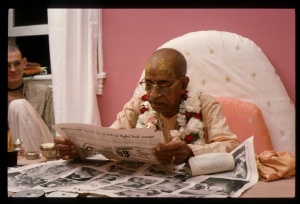CC Adi 15.10 (1975)

A.C. Bhaktivedanta Swami Prabhupada
TEXT 10
- śacī kahe,--nā khāiba, bhāla-i kahilā
- sei haite ekādaśī karite lāgilā
SYNONYMS
śacī kahe—mother Śacī said; nā khāiba—I shall not take; bhāla-i kahilā—You have said very nicely; sei haite—from that day; ekādaśī—Ekādaśī day; karite lāgilā—began to observe.
TRANSLATION
Mother Śacī said, "You have spoken very nicely. I shall not eat grains on Ekādaśī." From that day, she began to observe fasting on Ekādaśī.
PURPORT
It is a prejudice amongst smārta-brāhmaṇas that a widow must observe fasting on Ekādaśī but a woman who has her husband should not. It appears that before the request of Lord Caitanya Śacīmātā was not observing Ekādaśī because of her being sa-dhava, which means that her husband was living. Śrī Caitanya Mahāprabhu, however, introduced the system that a woman, even if not a widow, must observe the Ekādaśī day and must not touch any kind of grains, even those offered to the Deity of Viṣṇu.